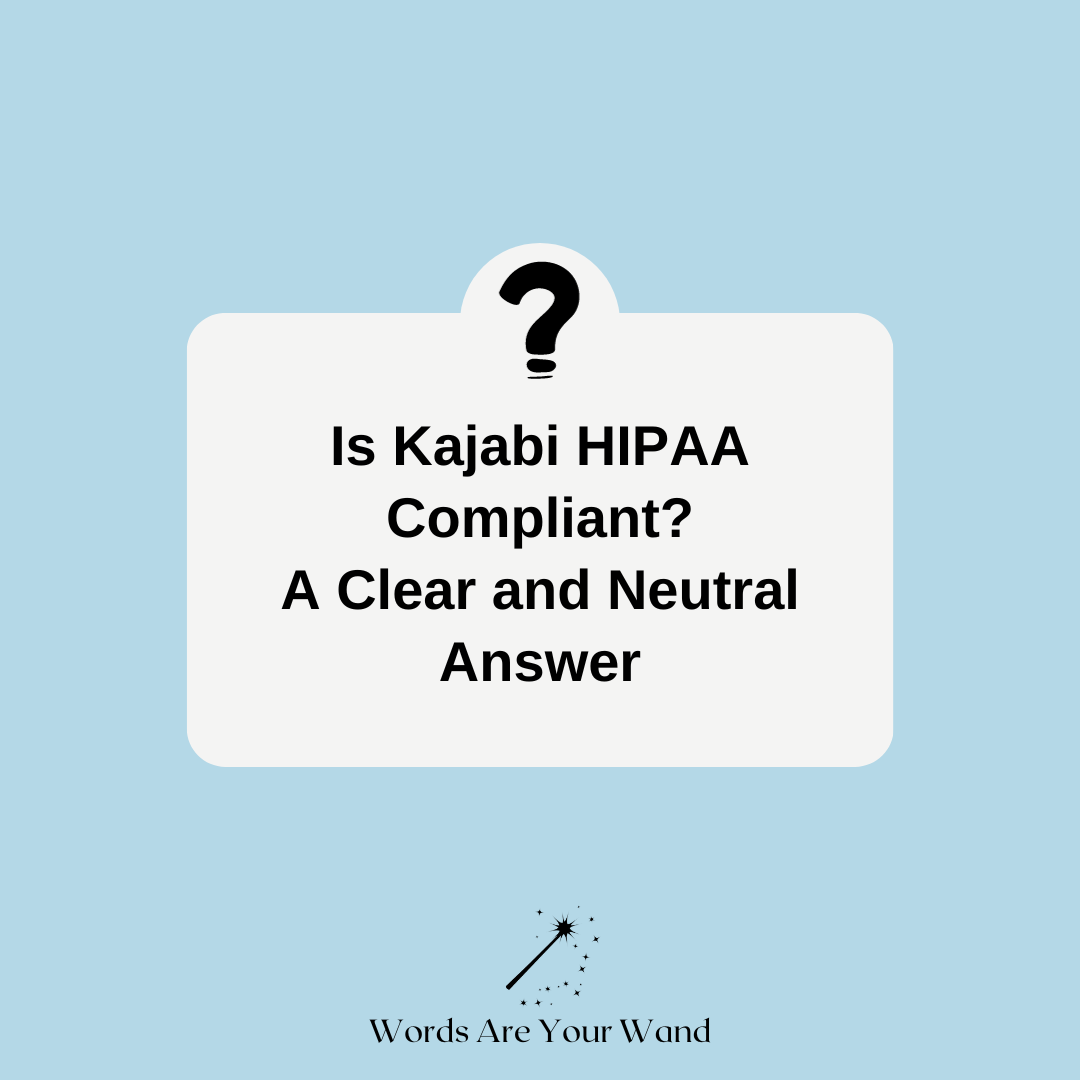Content Guide
Understanding Kajabi and HIPAA

Kajabi is a cloud-based content marketing platform that allows users to create and sell engaging content through full-fledged classes or coaching programs. However, Kajabi is not HIPAA-compliant, which means it is unsuitable for anyone in the personal health industry.
HIPAA is the acronym for the Health Insurance Portability and Accountability Act, a US federal law that sets the standards for protecting sensitive patient health information. The law applies to healthcare providers, health plans, clearinghouses, and business associates.
Kajabi is not designed to store or process medical information, so it cannot be used to collect and store personal health data. Therefore, if you operate a business in the health industry, such as selling personal healthcare products, Kajabi is not the platform for you.
It is important to note that Kajabi may collect personal information from its users, such as name, email address, and billing information, subject to various privacy regulations worldwide. However, Kajabi offers various features to help its users comply with these regulations, such as data collection forms and double opt-in.
Is Kajabi HIPAA Compliant?

HIPAA (Health Insurance Portability and Accountability Act) is a set of regulations that govern the privacy and security of healthcare information in the United States. If you are a healthcare provider or a business associate who handles protected health information (PHI), you must comply with HIPAA regulations.
Kajabi’s policies and terms of use clearly state that the platform is not HIPAA compliant. This means that if you are a healthcare provider or a business associate who handles PHI, you should not use Kajabi for your business.
While Kajabi is not HIPAA compliant, other platforms offer HIPAA-compliant solutions for healthcare providers and business associates. These platforms have implemented the necessary technical, physical, and administrative safeguards to ensure the privacy and security of PHI.
5 Reasons Why Kajabi May Not Be HIPAA Compliant

Kajabi is a popular platform for creating and selling online courses, membership sites, and digital products. However, if you are operating in the personal health industry or collecting and storing personal health data, Kajabi may not be your best choice.
Here are some reasons why Kajabi may not be HIPAA compliant:
1. Kajabi is not designed for the healthcare industry
Kajabi is a general-purpose platform not specifically designed for the healthcare industry. Therefore, it may not have the necessary features and safeguards to protect sensitive health information.
2. Kajabi does not sign Business Associate Agreements (BAAs)
A BAA is a legal agreement between a covered entity (such as a healthcare provider) and a business associate (such as a software vendor) that outlines how the business associate will protect the covered entity’s protected health information (PHI). Kajabi does not sign BAAs, meaning it assumes no legal responsibility for protecting PHI.
3. Kajabi does not provide encryption for data at rest
Encryption is a critical security measure that protects data from unauthorized access. Kajabi does not encrypt data at rest, meaning sensitive health information may be vulnerable to theft or hacking.
4. Kajabi does not provide audit logs
Audit logs are records of all the activities performed on a system, such as who accessed what data and when. Audit logs are essential for tracking and investigating security incidents. Kajabi does not provide audit logs, making detecting and responding to security breaches difficult.
5. Kajabi does not provide HIPAA training for its employees
HIPAA requires covered entities and business associates to train their employees to protect PHI. Kajabi does not provide HIPAA training for its employees, which means they may be unaware of the requirements and best practices for protecting sensitive health information.
In summary, Kajabi is not HIPAA compliant and may not be suitable for anyone operating in the personal health industry or collecting and storing personal health data. If you need a HIPAA-compliant platform, you should consider using a specialized healthcare platform or a HIPAA-compliant cloud service provider that can sign BAAs, provide encryption for data at rest, provide audit logs, and offer HIPAA training for its employees.
The Importance of HIPAA Compliance

HIPAA compliance is crucial for healthcare providers, health plans, healthcare clearinghouses, and business associates of HIPAA-covered entities. The Health Insurance Portability and Accountability Act (HIPAA) establishes a national standard for protecting individuals’ medical records and other personal health information. HIPAA compliance protects sensitive personal and health information from unauthorized access, use, or disclosure.
HIPAA compliance also helps to prevent data breaches, which can lead to significant financial and reputational damage. In 2020, the healthcare industry was the most targeted sector for data breaches, accounting for 45% of all reported breaches. These breaches can result in losing sensitive personal and health information, including social security numbers, medical diagnoses, and treatment information.
Non-compliance with HIPAA can result in significant penalties. The Department of Health and Human Services’ Office for Civil Rights (OCR) enforces HIPAA’s privacy and security rules. OCR can impose civil monetary penalties of up to $1.5 million per violation for non-compliance with HIPAA.
HIPAA compliance also helps to build trust between healthcare providers and patients. Patients are more likely to trust healthcare providers who take the necessary steps to protect their personal and health information. HIPAA compliance helps to ensure that healthcare providers are transparent about their data privacy and security practices, which can help to build trust with patients.
In summary, HIPAA compliance is essential for protecting sensitive personal and health information, preventing data breaches, avoiding significant penalties, and building patient trust. Healthcare providers, health plans, healthcare clearinghouses, and business associates of HIPAA-covered entities must implement multiple safeguards to protect sensitive personal and health information.
5 Alternatives to Kajabi for HIPAA Compliance

Kajabi is not HIPAA compliant and has no plans to become so. If you are operating in the personal health industry or collecting and storing personal health data, Kajabi is not a suitable platform. However, several Kajabi alternatives are HIPAA-compliant and can meet your needs. Here are some options to consider:
1. Podia
Podia is a platform for creating and selling online courses, digital downloads, and memberships. It is HIPAA compliant and has features allowing you to collect and store personal health data securely. Podia also has robust marketing and sales tools to help you grow your business.
2. Teachable
Teachable is another platform for creating and selling online courses. It is HIPAA compliant and has features allowing you to collect and store personal health data securely. Teachable also has a user-friendly interface and a variety of customization options.
3. Thinkific
Thinkific is a HIPAA-compliant course creation platform with features allowing you to collect and store personal health data securely. It also has a drag-and-drop page builder, drip-feed course content creator, and video hosting, making it easy to create your courses.
4. LearnWorlds
LearnWorlds is a platform for creating and selling online courses that are HIPAA compliant. Its features allow you to collect and store personal health data securely. LearnWorlds also has various customization options and integrations with other tools to help you grow your business.
5. Mighty Networks
Mighty Networks is a platform for creating and selling online courses, memberships, and communities. It is HIPAA compliant and has features allowing you to collect and store personal health data securely. Mighty Networks also has various customization options and integrations with other tools to help you grow your business.
Overall, if you need a HIPAA-compliant platform that can meet your needs for collecting and storing personal health data, several Kajabi alternatives should be considered. Each platform has its unique features and benefits, so it’s important to evaluate your options carefully and choose the one that best fits your needs.
5 Steps to Ensure Your Platform is HIPAA Compliant

Ensuring that your platform is HIPAA compliant is crucial for dealing with protected health information (PHI). Here are some steps you can take to ensure that your platform is HIPAA-compliant:
1. Conduct a Risk Assessment
Conducting a risk assessment is the first step toward HIPAA compliance. It helps you identify potential security risks and vulnerabilities in your platform. You can use the risk assessment results to develop a plan to mitigate any identified risks.
2. Develop HIPAA Policies and Procedures
Developing HIPAA policies and procedures is essential to ensure your platform meets HIPAA requirements. Your policies and procedures should cover access control, data encryption, data backup, and disaster recovery.
3. Train Your Employees
HIPAA compliance is not just about technology. It’s also about ensuring that your employees are trained to handle PHI. Your employees should be trained on HIPAA policies and procedures and how to identify and report any potential security incidents.
4. Implement Technical Safeguards
You can implement technical safeguards to protect PHI. Examples of technical safeguards include access controls, data encryption, and audit controls.
5. Monitor and Audit Your Platform
Monitoring and auditing your platform is essential to remain HIPAA compliant. You should regularly review access logs, audit trails, and other security-related information to identify potential security incidents.
By following these steps, you can ensure that your platform is HIPAA compliant and that you are protecting PHI in accordance with HIPAA regulations.
Consequences of Non-Compliance with HIPAA

The Health Insurance Portability and Accountability Act (HIPAA) is a federal law that regulates the use and disclosure of protected health information (PHI). Covered entities (CEs) and business associates (BAs) that handle PHI must comply with HIPAA regulations. Failure to comply with HIPAA can result in severe consequences, including:
1. Financial Penalties
The penalties for non-compliance with HIPAA can be significant. Civil monetary penalties can range from $100 to $50,000 per violation, depending on the level of culpability. Criminal penalties can also be imposed for intentional violations, leading to fines and potential imprisonment. In addition to the penalties, CEs and BAs may incur significant legal costs related to investigations and litigation.
2. Loss of Patient Trust
Non-compliance with HIPAA can also result in a loss of patient trust. Patients expect their PHI to be kept confidential and secure. A CE or BA violating HIPAA regulations can damage the organization’s reputation and erode patient trust. This can lead to a loss of business and negatively impact the organization’s bottom line.
3. Corrective Action Plans
In addition to financial penalties, CEs and BAs may also be required to implement corrective action plans (CAPs) to address HIPAA violations. CAPs can be expensive and time-consuming, requiring significant resources to implement. Failure to implement a CAP can result in additional penalties and legal action.
4. Other Legal Repercussions
Non-compliance with HIPAA can also lead to legal repercussions, such as government audits and class-action lawsuits. These legal actions can be costly and time-consuming, diverting resources from the organization’s core business activities.
In conclusion, non-compliance with HIPAA can have severe consequences for CEs and BAs. It is essential to ensure that your organization complies with HIPAA regulations to avoid financial penalties, loss of patient trust, and other legal repercussions.

